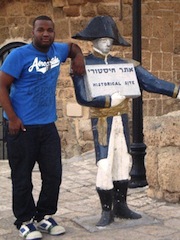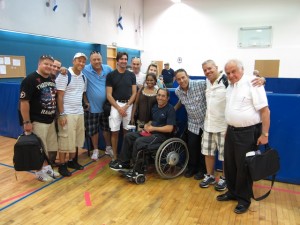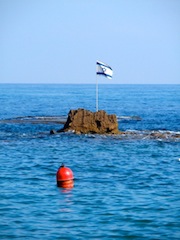I’ve been interested in Israel and the Middle East for the past 15 years. Growing up in a conservative Christian home, I heard all the arguments from Scripture that we should support Israel.
My story is not uncommon, though. I sort of “played” at religious faith for a number of years and, I’m almost ashamed to say, I did not really read and study my Bible until I was 33. My heart was being prepared for the experience of a lifetime.
On a cool February afternoon in 1998, I pressed my face to the airplane window and saw the coastline of Israel. I was the first member of my family to ever visit the Holy Land. Again, growing up with a certain theology, I was supportive of Israel, but only in a superficial sense. I don’t even remember watching the famous signing of the Oslo Accords on the White House lawn in 1993!
Yet here I was, with my friend and mentor, David Lewis. David was a champion for Israel, and he had invited me along to help with research for his new book. I shall never forget it.
With David, I met a number of people, including an hour-long interview with Ariel Sharon. I saw how small the country was. I saw the concrete barriers that bus riders stood behind in the West Bank (they are routinely the targets of snipers). We visited the outdoor mall on Ben Yehuda Street in Jerusalem, even standing on the spot where a homicide bomber had detonated the year before.
I began to understand what Israel faces in the form of terrorism.
For those who support Israel and engage in advocacy for the Jewish state, our shoulders often sag as we trudge through the day-to-day news coming from the Middle East. Yet, for me—blending my faith in Scripture (the Bible tells us that God loves the Jewish people eternally, and He watches over them) with my experiences in Israel and America, linking arms with like-minded pilgrims on the journey through this life—I am drawn to stories of hope.
Thankfully, my perspective is that a wonderful future is coming for all people, including and most especially my precious Jewish friends. I love them, truly.
Happily, I am able to find stories of hope and healing. Those are the things I choose to mostly focus on, not the doom-and-gloom of both the religious and secularists, who dourly predict a future for people in the Middle East in which misery and suffering are perpetual.
So it is that I have a lovely story for you, one of hope and healing in the Holy Land.
My friends at the America-Israel Friendship League (AIFL—www.aifl.org) are busy engaging people who are beginning to see a future hope with fresh eyes.
Two stories, actually, to fold into one:
Stefan Williams immigrated to the U.S., from his native Guyana, and is now a student at Hunter College in New York. After his family hosted two Israeli students a few years ago, the favor was returned to Stefan this year, as he traveled to Israel for the first time, thanks to the efforts of the folks at AIFL.
Dr. Charlotte Frank, chair of the executive committee and a long-time educator in New York City, is a driving force behind the group’s YASE (Youth Ambassador Student Exchange), which links students from different cultures, so that they can gain a better understanding of Middle East cultures. The program is helping break down walls of suspicion. Stefan recognizes this:
“Today I continue to maintain a relationship with almost everyone I have met in Israel and I have made numerous trips to the airport to pick up friends visiting to the U.S from Israel. We have spent countless hours together and I hope to maintain these relationships for the foreseeable future.”
Stefan visited the students his family hosted, and they live in Rishon Lezion, one of the oldest communities in modern Israel.
Dr. Frank is thrilled to be able to facilitate such trips:
“After a while, we realize that we are all really more similar than we are different.”
Stefan is studying criminal justice at Hunter College, and anticipates a bright future. His experience in Israel will continue to unfold as he goes forward:
“I can’t even put in words the gratitude I have for these people who opened their homes and hearts to me. Today many of my friends in Israel are officers in the army and some have already completed their mandatory service and are beginning their studies for entrance examination to attend an Israeli university.”
On the heels of Stefan’s visit to Israel, AIFL President Harley Lippman had the pleasure last month of hosting a tour of Israel, for U.S. wounded veterans. Lippman flew to Israel with 10 soldiers wounded in Iraq and Afghanistan. Incredibly, they were able to meet their counterparts in the IDF.
“Immediately, there was a powerful connection between the vets,” Lippman said. “It was an honor for me to be present; it is extremely rare for someone who is not a wounded vet to participate in such a setting.”
Judy Isaacson Schaffer, founder of the “Heroes to Heroes” program, was thrilled with the success of the trip:
“At moments it feels like a miracle, other moments are tear-filled, and many are filled with laughter. The brotherhood between our veterans and the Israelis is so strong that it feels as if we’ve been here for a month.
“When I started Heroes I guess I hoped for some kind of connection. This is beyond my wildest dreams. Participants are already collecting addresses to make sure they stay in touch with their Israeli friends.”
Kenneth Bialkin, chairman of the AIFL, is also happy with the results:
“America’s wounded GIs including two female soldiers put themselves in harm’s way for us, and, on this trip to Israel, the veterans had the chance to see for themselves the warmth, care, and love all Israelis have not only for their own wounded soldiers, but for those who were wounded fighting for America as well,” said Bialkin.
Like many American visitors to Israel, I’ve gotten the obligatory photo with IDF soldiers. Yet like our U.S. wounded vets, I also feel a genuine connection with these young men and women who put themselves in harm’s way for their country. Many Americans don’t realize these young men and women of the IDF are also indirectly a frontier outpost, fighting terror and keeping much of it away from the West.
Several years ago, I had two of the most moving experiences of my life, meeting two of the commandos who flew to Entebbe in 1976, to rescue hijacked airline passengers. One of them, Surin Hershko, who was paralyzed by a bullet to the neck, epitomizes the spirit of these vets who connected via the Heroes to Heroes program, initiated by Lippman, Bialkin, and Schaffer. Surin looked me in the eye and said:
“I still remember what it means to be a soldier. I would do it again [fly to Entebbe].”
Wow. Knowing what I know about the Israelis, I am certain that those who love freedom will continue on together until peace comes to mankind.
Hearing about Stefan’s connection, and the deeply moving trip for the U.S. veterans, I am reminded that we are all going forward together. May the God of Abraham, Isaac, and Jacob continue to watch over us all.
Kudos to the AIFL, for making such trips possible. If you’d care to hear more information about trips to Israel, let me know. Maybe you’ll soon be pressing your face to an airplane window, to see a remarkable people and nation.



